Garlic is harmful to cats, more dangerous than onions by five times for causing anemia. While sharing your food with your cat sounds nice, be careful. Cats are very sensitive to certain human foods, like garlic. It’s best to avoid letting them eat any.
The ASPCA Animal Poison Control Center warns about garlic and onions for pets. They say that cats are even more sensitive than dogs. A tiny amount of garlic can cause real harm to your cat. The symptoms can show up within 12 hours to several days. This could lead to a deadly illness called hemolytic anemia.
Some people, including Dr. Martin Goldstein, think garlic is okay for pets in small amounts. But, it’s risky. They suggest a certain limit of garlic for cats to eat. Always check with your vet before giving any new foods or supplements to your cat.
Key Takeaways:
- Garlic is highly toxic to cats and can lead to serious health issues, such as hemolytic anemia.
- Symptoms of garlic toxicity in cats can appear within 12 hours to several days after ingestion.
- The ASPCA Animal Poison Control Center advises on the potential toxicity of garlic and onions to pets, especially cats.
- While some experts recommend garlic for pets, it’s crucial to approach this with caution and consult with your veterinarian.
- Other toxic foods for cats include chocolate, ice cream, milk, oranges, and avocado.
Understanding Garlic’s Effects on Cats
As a cat owner, knowing what foods are dangerous is important. Garlic comes from the Allium family, like onions and chives. These plants have substances that can harm cats, even in tiny doses.
Garlic’s Toxic Compounds for Cats
Thiosulfates in garlic are toxic to cats. They can damage a cat’s red blood cells, causing hemolytic anemia. This means that a cat’s cells are lost faster than they can be replaced, which lowers their oxygen levels.
Once eaten, garlic is five times more dangerous than onions for cats. Just a bit of it can harm organs or even cause death in a cat. Signs of poisoning might not show up until 2-5 days later. So, it’s very important to watch your cat closely.
How Garlic Affects a Cat’s Body
Garlic’s toxins mainly harm a cat’s kidneys and liver. Continued exposure can cause severe health problems. Quick vet help may be needed to treat these issues.
Cats showing garlic poisoning symptoms might:
- Vomit
- Have diarrhea
- Not want to eat
- Be tired a lot
- Have pale gums
- Breathe fast
- Have a fast heartbeat
- Seem weak
- Or even collapse
If your cat eats garlic or shows these signs, get to a vet right away. A vet might make your cat vomit, but they should do it. In bad cases, treatment could involve a hospital stay with a blood transfusion.
| Species | Toxicity Level | Symptoms Onset |
|---|---|---|
| Cats | Highest | 2-5 days |
| Dogs | Moderate | 1-3 days |
| Livestock | Low | Varies |
Cats are very sensitive to garlic, followed by dogs and some livestock. How much garlic eaten impacts the reaction. Finding the issue early and treating it fast improves a cat’s chances of getting well.
The Risks of Feeding Garlic to Cats
Garlic is found in many human foods. But, it’s very dangerous for cats. Even a little garlic can harm their health. This means cat owners must avoid giving garlic to their pets.
Hemolytic Anemia in Cats Caused by Garlic
Garlic can lead to a serious blood disease in cats. It affects their red blood cells, causing them to be destroyed too early. This illness is called hemolytic anemia. Common signs are:
- Pale gums
- Weakness
- Lethargy
- Rapid breathing
- Elevated heart rate
In bad cases, cats might need a blood transfusion. Cats are much more vulnerable to garlic than dogs or livestock. For them, garlic is 3-5 times worse than onions.
Other Potential Health Complications
There are more risks from garlic for cats. These include:
- Vomiting
- Diarrhea
- Loss of appetite
- Abdominal pain
- Organ damage (especially the liver and kidneys)
- Organ failure
- Death in severe cases
Garlic harms a cat’s immune system too. This makes them ill more easily. They might not recover as quickly or as well from sickness.
| Amount of Garlic | Potential Effects on Cats |
|---|---|
| 1 clove or 1/8 tsp garlic powder | Organ damage, organ failure, or death |
| Small amounts over time | Hemolytic anemia, weakness, lethargy |
| Cooked or raw garlic | Equally harmful to cats |
It’s crucial for cat owners to understand the dangers of garlic. Keep garlic away from your cats. If you think your cat has eaten garlic, call the vet right away. Avoiding garlic and other items in the same family is best for your cat’s health.
Common Misconceptions About Garlic and Cats
It’s vital for cat owners to know the truth about garlic myths. Some people think cooking garlic or using garlic powder might make it safe for cats. But, all forms of garlic are harmful to them.
Also, some owners may trust garlic supplements for pets. But, these items are not FDA regulated and might harm cats. Always ask your vet about supplements or new foods.
Many believe a small amount of garlic is okay for cats. Yet, studies show it is more toxic than onions. Any amount of garlic can cause serious health problems.
- Gastroenteritis
- Vomiting
- Diarrhea
- Nausea
- Abdominal pain
- Drooling
- Oral irritation
- Anemia
- Elevated heart rate
- Increased respiratory rate
- Organ function problems
- Lack of energy
- Death (in severe cases)
Garlic poisoning symptoms in cats might not show up right away. Effects can be delayed for days. If you think your can may have eaten garlic, call your vet for help quickly.
| Myth | Fact |
|---|---|
| Cooking garlic makes it safe for cats | Cooking does not remove the toxic compounds in garlic |
| Garlic powder is less harmful than fresh garlic | All forms of garlic, including powder, are toxic to cats |
| Garlic supplements are safe for pets | Supplements are unregulated and may contain harmful ingredients |
| A small amount of garlic won’t harm cats | Even trace amounts can cause various health issues in cats |
To protect your cat, don’t give them garlic or similar plants. Teach everyone around about garlic dangers. By knowing the facts, you can keep your cat healthy and safe.
Symptoms of Garlic Poisoning in Cats
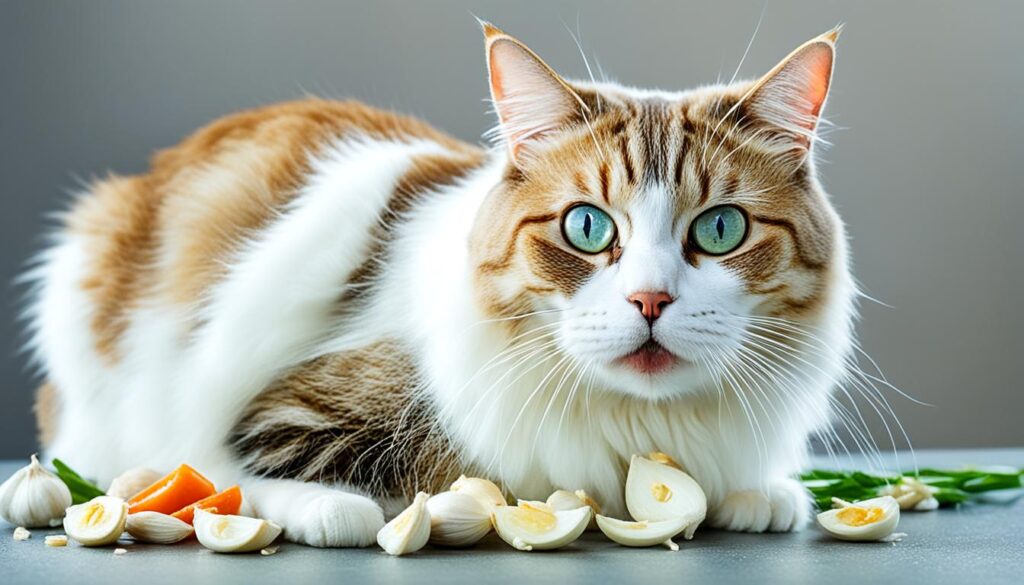
Garlic poisoning in cats leads to various symptoms which affect different parts of their bodies. It’s vital for cat owners to know these signs. This way, if your cat eats garlic by mistake, you can get them to a vet quickly. Spotting these symptoms early helps your cat recover well.
The effect of garlic poisoning in cats varies based on how much they eat and their own body’s response. Even a small bit can be dangerous. Garlic is worse for cats than onions. Just a little can cause harm. Symptoms might show up the next day or a few days later.
Gastrointestinal Symptoms
The first signs of garlic poisoning are usually stomach-related. Cats might vomit and have diarrhea. They could also act like their stomach hurts, be restless, pace, meow loudly, or avoid being touched. In serious cases, they might even turn yellow, which shows liver damage.
Respiratory Symptoms
Garlic can hurt a cat’s breathing too. They might breathe heavily or quickly, cough, or wheeze. This happens because garlic damages their red blood cells. They can’t carry oxygen as well, which is dangerous. Breathing problems can be life-threatening if not treated.
Neurological Symptoms
If garlic poisoning is severe, cats might have brain-related symptoms. They could seem confused, shake, or have seizures. These symptoms are a sign the poisoning is serious. The cat urgently needs help. Quick action is key to stopping long-term brain damage.
| Symptom Category | Specific Symptoms |
|---|---|
| Gastrointestinal | Vomiting, diarrhea, abdominal pain, jaundice |
| Respiratory | Difficulty breathing, coughing, wheezing |
| Neurological | Disorientation, tremors, seizures |
Other signs of garlic poisoning include dribbling, sore mouth, pale gums, odd urine, not eating, looking tired, fast heartbeat, shaking, feeling dizzy, and maybe falling into a coma. If you think your cat ate garlic, don’t wait. Go to the vet right away. Acting fast boosts your cat’s recovery chances and avoids lasting harm.
What to Do If Your Cat Ingests Garlic
If you think your cat ate garlic, act fast and get help from a vet. Garlic is very toxic for cats. Even a small piece can make them very sick.
First, call your vet or an emergency vet for advice. They might tell you to make your cat vomit. It’s important to only do this if they say it’s okay. Vomiting needs to be done right, or it can be harmful.
Contacting Your Veterinarian
When you call your vet, have info ready:
- The amount of garlic your cat ate (if you know)
- When the garlic was eaten
- How your cat is acting now
- How much your cat weighs and if it’s usually healthy
Your vet will use this info to decide what to do next. They might say to come in right away or give you steps to follow at home.
Inducing Vomiting (If Advised by Vet)
If your vet says to make your cat vomit, they will explain how. This could mean using hydrogen peroxide to make them throw up. Always follow your vet’s advice closely. Never try to make your cat vomit without talking to a vet first.
Providing Supportive Care
If it’s serious, your cat might need to stay at the vet’s for a while. They could get treatments like:
- Activated charcoal to soak up the toxins
- IV fluids to stay hydrated and help organs work better
- Tests to see how bad it is and give the right meds
- Medicines to help with symptoms and stop more harm
- In very bad cases, a blood transfusion might be needed to fix blood problems
| Amount of Garlic Ingested | Potential Consequences | Recommended Action |
|---|---|---|
| Less than 1/2 teaspoon minced or 1/8 teaspoon powder | Mild to moderate toxicity | Contact veterinarian for guidance |
| One small clove (4-7 grams) | Severe toxicity | Seek emergency veterinary care |
| Large amounts (multiple cloves) | Life-threatening toxicity | Immediate emergency veterinary intervention |
Cats often get better if they ate just a little garlic and see a vet quickly. But too much garlic can be deadly. Watch your cat closely and do what your vet says to help them heal.
Prevention: Keeping Garlic Away from Cats
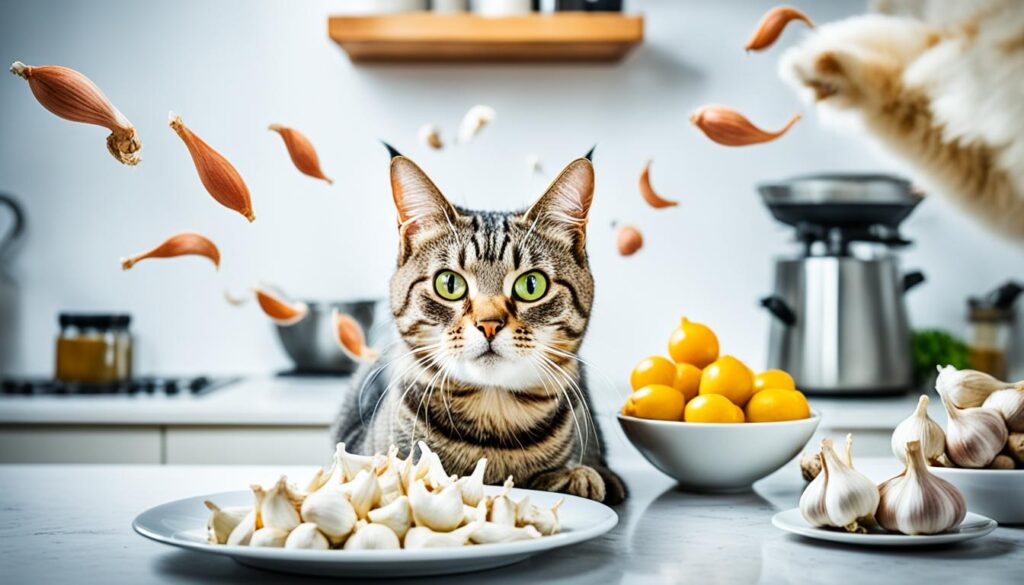
Being a cat owner means keeping your pet safe. It’s vital to stop garlic from harming your cat. Make sure your home is safe by keeping all garlic products away. This includes raw garlic, garlic powder, and foods that have garlic in them. Store your cat’s food in places they can’t reach.
When you cook, make sure your cat isn’t around. They should not be near any garlic. A tiny bit of garlic can really hurt a cat. This small amount could cause serious health problems or even death. Always keep your cat away from garlic.
A crucial part of keeping your cat safe is to avoid garlic in their food. Before sharing any food with your cat, check the ingredients. Cats are more sensitive to garlic than some animals. This means garlic can harm them much more than other pets.
| Garlic Form | Toxicity Level |
|---|---|
| Raw garlic | Highly toxic |
| Cooked garlic | Highly toxic |
| Garlic powder | Highly toxic (1/8 tsp can be poisonous) |
| Garlic-containing foods | Toxic (depending on garlic content) |
It might take a few days for your cat to show symptoms if they ate garlic. If you think your cat ate garlic, call your vet or the ASPCA Poison Control at 888-426-4435 right away. Quick treatment is key to helping your cat get better.
To keep your cat healthy, work on a few things. Cat-proof your home. Keep their food in safe places. Don’t let them eat garlic. And always watch out when cooking with garlic. Doing these things will help protect your feline friend.
Can cats eat garlic?
As a cat owner, knowing what’s safe to feed your pet is key. Many wonder if cats can eat garlic safely. The simple answer is no. Cats shouldn’t have garlic, onions, or chives because they have toxins. These can easily harm your cat, even in small doses.
The Straightforward Answer
Garlic is a strict no for cats. It has thiosulfates that hurt red blood cells. This can lead to hemolytic anemia. Basically, it stops oxygen from moving around their body right, which is very bad. It can make your cat very sick or even die if not treated.
Reasons Why Cats Should Avoid Garlic
Why is garlic so bad for cats? Here’s why we should keep it away from them:
- Garlic is more poisonous to cats than onions, which are already really harmful.
- Even a small bit of garlic, like a tiny clove, is too much for a cat.
- Garlic in any form, like powder or minced, can be trouble for cats.
- The symptoms of garlic poisoning might not show up right away, confusing the diagnosis.
- It can cause digestive problems, make them tired, and even change the color of their skin.
If you think your cat ate garlic, call the vet right away. The Pet Poison Helpline at 855-764-7661 or the ASPCA at 888-426-4435 can help. They’ll know what to do. Do not try to make your cat vomit at home. Let the experts handle it.
| Toxicity Comparison | Garlic | Onions |
|---|---|---|
| Toxicity to Cats | 5 times more toxic | Less toxic than garlic |
| Toxic Amount for Average Cat (10-12 lbs) | Less than 1 small clove (4-7 grams) | Larger amount compared to garlic |
To wrap it up, never give your cat garlic. Even a little can cause big problems. Understand what’s not safe for your cat. Always talk to your vet about what your cat can eat. And get help fast if you think they ate something bad.
Safe Alternatives to Garlic for Cats
I always put my cat’s health first. While people love adding garlic to food, it’s bad for cats. But, there are many safe spices that can make your cat’s meals tasty without any risks.
Cat-Friendly Herbs and Flavors
You can make your cat’s food more interesting by using catnip, parsley, or basil. Sprinkle these herbs on their food from time to time. But remember, check with your vet first. We want to make sure anything new is safe for your cat.
Adding new flavors is a great idea, too. Try tuna, chicken, salmon, turkey, or beef. Many cat foods come in these flavors, so you can find them easily.
Commercial Cat Foods and Treats
For the best diet, choose cat food meant just for them. These foods are made to be safe and healthy. They never include dangerous substances like garlic.
Here are some trusted brands that make garlic-free food:
| Brand | Product | Features |
|---|---|---|
| Hill’s Science Diet | Adult Indoor Dry Cat Food | Balanced nutrition, no artificial colors, flavors, or preservatives |
| Royal Canin | Feline Health Nutrition Wet Food | Tailored nutrition for specific life stages and breeds |
| Purina Pro Plan | Focus Adult Dry Cat Food | High-quality protein sources, essential nutrients for overall health |
| Blue Buffalo | Wilderness High Protein Grain Free Dry Cat Food | Grain-free, protein-rich formula for optimal muscle maintenance |
Choosing the right food is crucial. Look for food that matches your cat’s age, breed, and health. This way, they get all the nutrition they need without any harm from garlic.
The Importance of a Balanced Feline Diet
Understanding what our cats need to eat is vital for any cat owner. Cats have specific nutritional needs. These are different from ours. Feeding them a diet made just for them is key to their health. This is true for both their body and mind.
Cats need lots of protein. They get this protein mostly from meat. This makes protein-rich foods like meat, poultry, and fish very important for them. Proteins have elements, such as taurine, that cats can’t live without. They help keep the heart, eyes, and more working well.
Apart from proteins, cats need:
- Fatty acids for a soft, glossy coat and healthy skin
- Vitamins for a range of tasks and strong immunity
- Minerals to keep bones and teeth tough
We should avoid sharing our food with cats. Some foods we eat can make them sick. For example, garlic and onions are bad for cats. They can harm the blood and cause serious problems.
| Food Item | Toxicity Level for Cats |
|---|---|
| Garlic | High |
| Onions | High |
| Chives | High |
| Chocolate | High |
| Grapes and Raisins | High |
We should feed our cats as the vet suggests. This includes using cat food made for their needs. These cat foods are balanced and fit each cat’s life stage.
To keep our cats healthy, the right food is essential. Remember, stay away from things like garlic. This simple care can lead to a long, healthy life for our feline friends.
When to Seek Veterinary Advice
If you own a cat, you must look after its health. Make sure your vet checks your cat regularly. This step helps find and solve health problems early. It’s also a good time to talk about your cat’s food and any worries you have. Your vet will give you great advice to take care of your cat well.
Scheduling Regular Check-Ups
Visit your vet at least once a year for a thorough check-up. If your cat has special needs, you might need to go more often. At these visits, your vet will check everything from your cat’s weight to its behavior. You’ll also update vaccinations and talk about keeping parasites and teeth problems away.
Addressing Concerns About Your Cat’s Diet
Don’t be shy about talking food with your vet if you’re worried. They will give you tips based on your cat’s specific needs. This includes picking the right cat food and handling things like allergies or weight issues.
It’s really dangerous to feed your cat garlic. It can hurt their blood cells and make them very sick. Always keep garlic out of reach of your cat.
| Amount of Garlic | Potential Effects on Cats |
|---|---|
| Less than one small clove | Can be toxic to an average-size cat |
| Small quantities of minced garlic or garlic powder | Can be toxic to cats |
| Garlic is five times more toxic than onions | Makes even small amounts dangerous for cats |
If you think your cat ate garlic by mistake, see the vet right away. Symptoms include being very tired, pale gums, fast heart, and odd-colored pee. The vet will do their best to treat your cat and keep them safe.
By keeping up with vet visits and tackling diet worries, you’re doing your best for your cat. Your vet is there to help you keep your cat happy and healthy, so always reach out if you need advice.
Conclusion
Being a good pet owner means making sure your cat stays healthy. You should avoid giving your cat foods like garlic that can be harmful. Even though you might want to share your food with them, it’s really important to know that cats can not eat garlic. This vegetable, along with onions and chives, has things in it that can hurt a cat’s blood. This might make them very sick, causing problems like vomiting, diarrhea, and weakness.
So, it’s best to not give your cat any garlic. This rule applies even if the garlic is cooked. Instead, feed your cat food that is made just for them. If you think your cat ate garlic or something else dangerous, go see the vet right away. A vet can tell you the best way to take care of your cat’s food and health.
Understanding the dangers of garlic for cats is important. By avoiding risky foods and taking steps to keep your cat safe, you’re doing a great job. It’s key to always think about your cat’s well-being. With a focus on safe eating and keeping harmful things away, your cat can have a wonderful life. This way, they will stay happy and healthy with you.

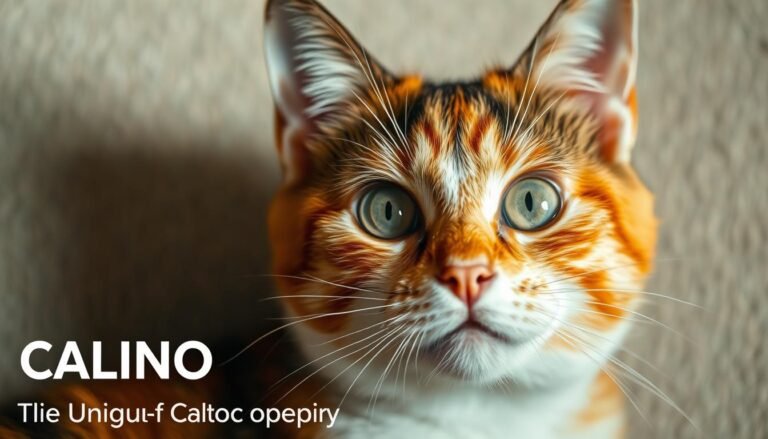
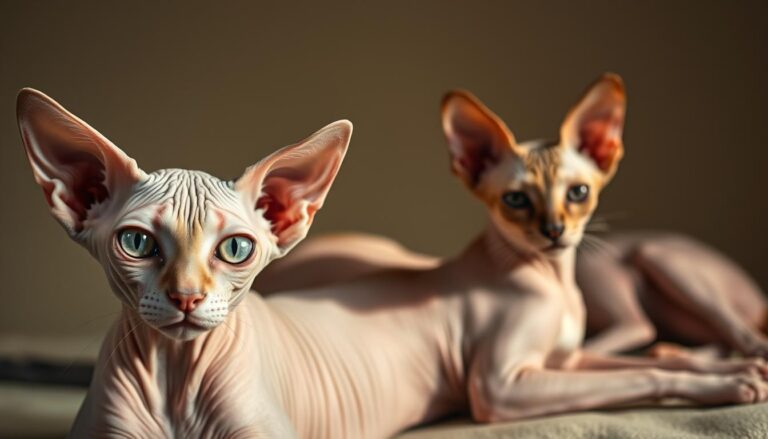
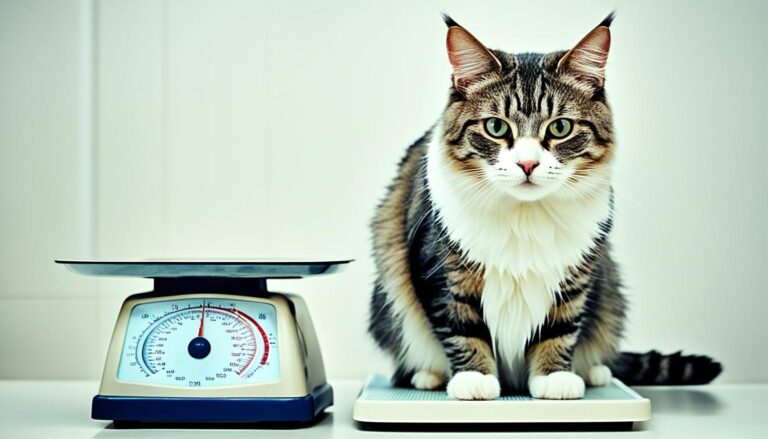




[…] be the best food for them. In the U.S., many cats are too heavy. It’s key to watch what they eat and limit sugary foods like […]
[…] Beagles are great friends for cats. They were born to hunt in a team, meaning they are welcoming to both animals and humans in their space. Beagles are known as top pets for getting along with others, with 95% of Beagle owners saying they mix well with their other pets. […]
[…] implementing these preventive measures, cat owners can significantly reduce the likelihood of their feline companions developing arthritis and enjoy many years of happy, healthy […]